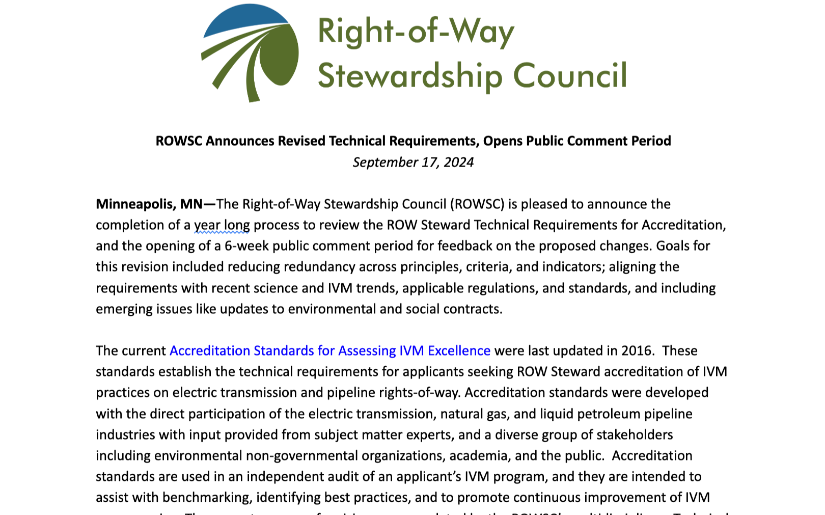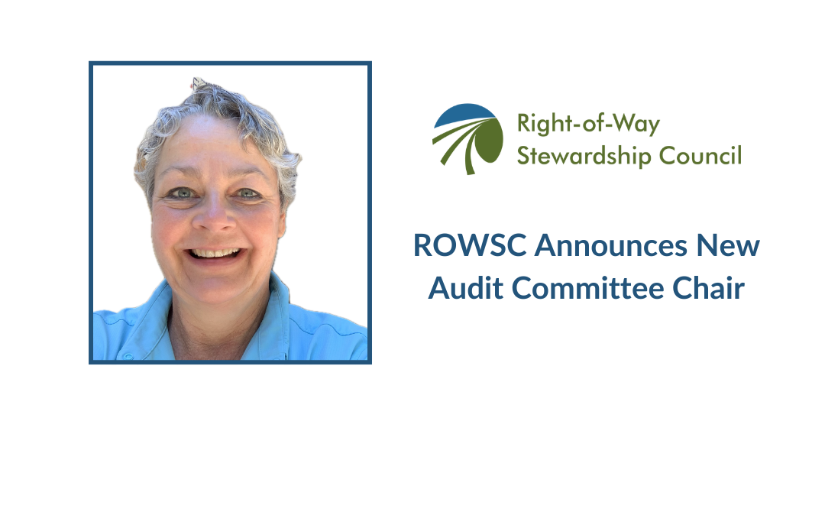ROWSC Announces Revised Technical Requirements, Opens Public Comment Period
Minneapolis, MN—The Right-of-Way Stewardship Council (ROWSC) is pleased to announce the completion of a year long process to review the ROW Steward Technical Requirements for Accreditation, and the opening of a 6-week public comment period for feedback on the proposed changes. Goals for this revision included reducing redundancy across principles, criteria, and indicators; aligning the requirements with recent science and IVM trends, applicable regulations, and standards, and including emerging issues like updates to environmental and social contracts.
The current Accreditation Standards for Assessing IVM Excellence were last updated in 2016. These standards establish the technical requirements for applicants seeking ROW Steward accreditation of IVM practices on electric transmission and pipeline rights-of-way. Accreditation standards were developed with the direct participation of the electric transmission, natural gas, and liquid petroleum pipeline industries with input provided from subject matter experts, and a diverse group of stakeholders including environmental non-governmental organizations, academia, and the public. Accreditation standards are used in an independent audit of an applicant’s IVM program, and they are intended to assist with benchmarking, identifying best practices, and to promote continuous improvement of IVM programming. The current process of revision was completed by the ROWSC’s multidisciplinary Technical Advisory Committee (TAC),
“There are four main changes within the revised requirements,” said John Steelman, Co-chair of the ROWSC and Chair of the TAC, “Reductions of redundant verifiers, modification of aging verifiers, consistency in terminology for IVM personnel, methods, and vegetation maintenance treatments, and a greater emphasis for natural resource mapping, planning, conservation, and monitoring.”
Following input from stakeholders via the public comment process, the TAC will prepare final revision recommendations in a final draft of the technical standards for approval by the full ROWSC. The revised standard is anticipated to be finalized by the end of 2024. Existing ROWSC Accredited Utilities will have 12 months to come into compliance with the revised standards. All new applications for Accreditation after January 1, 2024, will be expected to pursue accreditation under the proposed revised standard. Many thanks to the following individuals for contributing to the process via their service on the TAC: John Steelman, TAC chair, Pam Money, auditor team lead, John Goodfellow, Randy Miller, Phil Charlton, Geoff Kempter, Rich Hendler, Phil Chen, and Kieran Hunt.
To support the public comment period, a document summarizing high level changes and a clean version of the revised standards are available. Interested parties can submit comments at www.surveymonkey.com/r/ROWSCpubliccomment.
#######
About Right-of-Way Stewardship Council
Right-of-Way Stewardship Council is an accreditation program led by a diverse group of stakeholders including industry, government, academia, and environmental NGOs, in order to provide standards of excellence for environmental stewardship along rights-of-way (ROW) and present the opportunity for utility companies to demonstrate their commitment to such standards. It establishes standards for responsible ROW vegetation management within high-voltage electric transmission corridors. The aim of the program is to promote the application of integrated vegetation management and best management practices to the utility vegetation management industry in order to maintain power system reliability and address ecological concerns.




Recent posts